

"TOGETHER" - THIS VIDEO CAN CHANGE YOUR LIFE. Fomo, stress and sleeplessness: are smartphones bad for students? As with all technology, mobile phones can have their pros and cons, depending on how they are used.
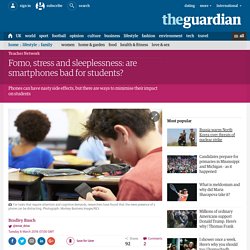
At their best, they can be useful tools for staying in touch, finding out new information and co-ordinating social activities. At worst, they can negatively affect concentration, communication and sleep, or increase fear of missing out, procrastination and stress. These potential negative consequences are especially important to consider for teenagers. Why I Just Asked My Students To Put Their Laptops Away… Jonathan Haidt’s metaphor of the elephant and the rider is useful here.
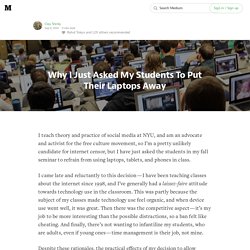
In Haidt’s telling, the mind is like an elephant (the emotions) with a rider (the intellect) on top. The rider can see and plan ahead, but the elephant is far more powerful. Sometimes the rider and the elephant work together (the ideal in classroom settings), but if they conflict, the elephant usually wins. After reading Haidt, I’ve stopped thinking of students as people who simply make choices about whether to pay attention, and started thinking of them as people trying to pay attention but having to compete with various influences, the largest of which is their own propensity towards involuntary and emotional reaction.
(This is even harder for young people, the elephant so strong, the rider still a novice.) Multitasking - Are We Digital Dummies? Age of Distraction: Why It’s Crucial for Students to Learn to Focus. Digital classroom tools like computers, tablets and smartphones offer exciting opportunities to deepen learning through creativity, collaboration and connection, but those very devices can also be distracting to students.
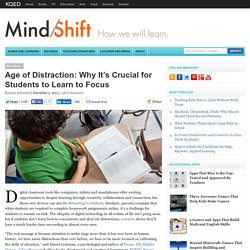
Similarly, parents complain that when students are required to complete homework assignments online, it’s a challenge for students to remain on task. The ubiquity of digital technology in all realms of life isn’t going away, but if students don’t learn how to concentrate and shut out distractions, research shows they’ll have a much harder time succeeding in almost every area. “The real message is because attention is under siege more than it has ever been in human history, we have more distractions than ever before, we have to be more focused on cultivating the skills of attention,” said Daniel Goleman, a psychologist and author of Focus: The Hidden Driver of Excellence and other books about social and emotional learning on KQED’s Forum program.
How Multitasking Slows Your Brain & Kills Your Productivity. It wasn’t long ago when people were consistently praised for multitasking– the parent who, in one night, juggles children’s homework, their own professional work, the laundry, and spinning classes.
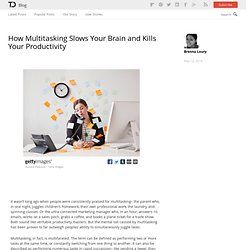
Or the ultra-connected marketing manager who, in an hour, answers 10 emails, works on a sales pitch, grabs a coffee, and books a plane ticket for a trade show. Both sound like veritable productivity masters. But the mental toll caused by multitasking has been proven to far outweigh peoples’ ability to simultaneously juggle tasks. Multitasking, in fact, is multifaceted. The term can be defined as performing two or more tasks at the same time, or constantly switching from one thing to another. Partial Attention / Multitasking. Is multi-tasking a myth? 20 August 2010Last updated at 12:04 Britons are increasingly overlapping their media habits - tapping out e-mails while watching TV, reading a paper while answering texts from friends.
But, asks Hugh Wilson, does media multi-tasking mean instead of doing a few things well, we are just doing more things badly? I was watching a documentary the other day about an educational issue that - as the father of a child about to start his first year at school - held more than a passing interest. At the same time, I was actively participating in a three-way text message conversation about the coming weekend. It's fair to say that, by the end of the evening, I had only a vague understanding of the message of the documentary and the weekend remained largely unplanned. Dr. Dave Walsh - The Multitasking Generation: Are Kids Juggling Too Much? - Mind Positive Parenting - Dr. Dave Walsh. Posted by Dr.
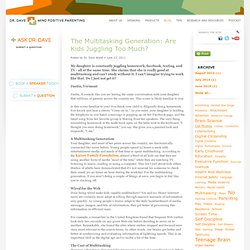
Dave Walsh • June 23, 2011 My daughter is constantly juggling homework, facebook, texting, and TV - all at the same time. She claims that she is really good at multitasking and can't study without it. I can't imagine trying to work like that. Media multitaskers pay mental price, Stanford study shows. Stanford Report, August 24, 2009 Think you can talk on the phone, send an instant message and read your e-mail all at once?
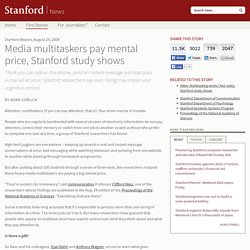
Stanford researchers say even trying may impair your cognitive control. By Adam Gorlick Attention, multitaskers (if you can pay attention, that is): Your brain may be in trouble. People who are regularly bombarded with several streams of electronic information do not pay attention, control their memory or switch from one job to another as well as those who prefer to complete one task at a time, a group of Stanford researchers has found.
Think You're Multitasking? Think Again.